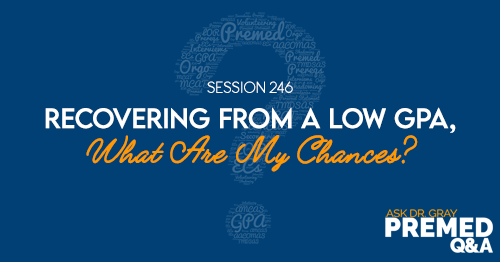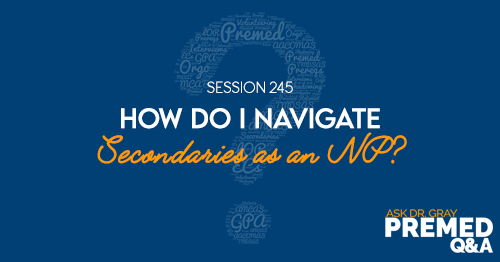Apple Podcasts | Google Podcasts
Session 198
This premed student wants to write about imposter syndrome in the adversity section of her secondaries. Is that okay to do?
Ask Dr. Gray: Premed Q&A is brought to you by Blueprint MCAT. Listen to this podcast episode with the player above, or keep reading for the highlights and takeaway points.
The episodes in this podcast are recordings of our Facebook Live that we do at 3 pm Eastern on most weekdays. Check out our Facebook page and like the page to be notified. Also, listen to our other podcasts on MedEd Media. If you have any questions, call me at 617-410-6747.
[00:26] Question of the Day
Q: “How do you recommend writing about challenges and failures on the secondaries? I’m writing my secondaries and I talked about how I dealt with imposter syndrome and not knowing how to be a premed student in general. And eventually, I overcame that by talking to other premed students and joining a premed club and its leadership board. Is it okay to talk about this?”
A: Avoid academic, MCAT-related, and application-related stuff when asked about failures and adversities in your secondary application. Besides, not knowing how to be a premed student is not exactly the kind of adversity they’re looking for.
What they’re potentially looking for is a time in your life outside of school. Because the school is a very protected environment, for the most part. Talk about outside of school where you had to face something, learn from it, grow from it, etc. Again, school is a very “forced and fake” environment where you may be growing. But then again, as much as possible, stay away from talking about your academics, the application, and the MCAT.
[02:30] The 3 Things You Don’t Care for At All Question
This student is also being asked about the three things she doesn’t care for at all and was wondering how to handle that.
She says she doesn’t care about flowers in the spring because she’s allergic to them. This is a perfect answer because this shows admissions committees who she is. Even though you’re talking about silly random things, that’s your truth and that’s who you are.
[03:10] Senior Home Caretaker Experience
She mentions working as a caretaker at a senior home and she was curious if she could put this in her activities section. She could of course put that, now whether it’s a clinical experience depends on specific duties she’s doing at the senior home. She explains she helps them with bathing and feeding and this is a good clinical experience.
[04:05] How to Prepare for the Medical School Interview
Besides The Premed Playbook: Guide to the Medical School Interview, the best way to prepare for the medical school interview is through mock interviews.
If you’re at an institution or university, you can ask your mentors to do mock interviews for you. Our amazing team at Mappd.com do mock interviews as well.
Our student is also wondering if she can give a rehash of her personal statement during the interview if asked why she wanted to be a doctor.
Lots of students fear this question but it’s going to have to be a rehash of your personal statement. There are no two ways about it. Obviously, you don’t want to memorize your personal statement so you can recite it during the interview. But it’s definitely going to be similar to your personal statement.
[06:05] Tips for Casper Test
One of the biggest mistakes that students make with Casper is they don’t explain their reasoning enough. They just get to an answer.
'The goal of Casper is to talk about why you're doing the thing you're doing.'Click To TweetThere are students who will get perfect scores on Casper with completely different answers. Some students will choose the first option and others will choose the other option. But if their rationale is logical, they could get the same score. Because they’re not looking for a specific answer. They’re looking for judgment. It’s a situational judgment test.
In terms of how it’s going to affect you, it depends on the schools that you’re applying to. Sometimes, they’re going to use it for interview purposes. Or they can use it to determine who to accept. They can also use it for data collection.
[07:57] How to Negotiate Scholarships and Financial Aids
Typically, schools will go through their process for accepting students. And then at some point, they’ll start offering scholarships for merit or scholarships for need, or whatever type of scholarship.
Maybe you have multiple acceptances. One school is offering you a financial aid package and the school that you’ve been accepted to doesn’t offer you any sort of financial aid. Now, you could go to that school and lay out your interest in them. But then the other school is offering your scholarship. Then ask if there’s any way they can help you decide to come to them. They could say no but at least you tried.
Links:
Medical School HQ Facebook page
Medical School HQ YouTube channel
Instagram @MedicalSchoolHQ
Join the Application Academy!
The Premed Playbook: Guide to the Medical School Personal Statement
The Premed Playbook: Guide to the Medical School Application Process
SEARCH SITE
LISTEN FOR FREE












